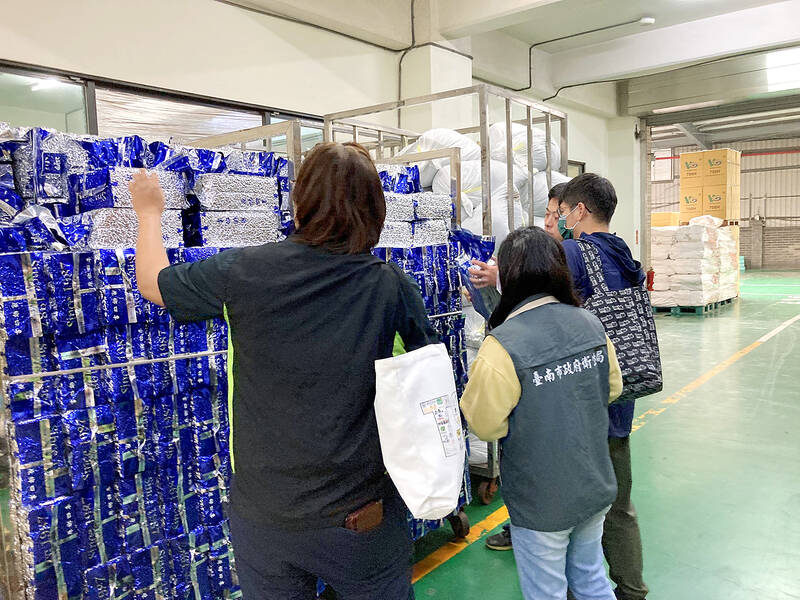Just one of 301 high-quality domestic tea products subject to random checks last year was found to have fabricated origins, yielding a 99.7 percent compliance rate for new labeling regulations, the Agriculture and Food Agency said yesterday.
Since 2023, the agency has required all domestically produced tea to be labeled with a place of origin, record of production and sale, or an organic label.
The rules ensure that manufacturers do not mix domestic teas with cheaper, imported tea from regions such as Vietnam to protect producer and consumer rights, and maintain the reputation of domestic tea, the agency said.

Photo courtesy of the Agriculture and Food Agency
To enforce these regulations, periodic and random spot checks are conducted using fake shoppers to purchase tea for testing, it said.
The inspections are a joint effort by the agency and organizations including the High Prosecutors’ Office, the Food and Drug Administration and the Tea and Beverage Research Station, it added.
Last year, the agency tested 501 samples of domestic tea, including 200 market samples and 301 competition-grade samples, it said.
Four were found to have undetermined origin and one contained imported tea mixed with domestic tea, which has been passed to the High Prosecutors’ Office for investigation and prosecution under articles 255 and 339 of the Criminal Code, it said.
Furthermore, labels were checked for 1,157 tea products, with 90 found to have labels that were not sufficiently clear — a 92.2 percent compliance rate, it added.
The manufacturers have been notified to rectify labeling to meet industry standards and regulations, the agency said.

Taiwan has received more than US$70 million in royalties as of the end of last year from developing the F-16V jet as countries worldwide purchase or upgrade to this popular model, government and military officials said on Saturday. Taiwan funded the development of the F-16V jet and ended up the sole investor as other countries withdrew from the program. Now the F-16V is increasingly popular and countries must pay Taiwan a percentage in royalties when they purchase new F-16V aircraft or upgrade older F-16 models. The next five years are expected to be the peak for these royalties, with Taiwan potentially earning

STAY IN YOUR LANE: As the US and Israel attack Iran, the ministry has warned China not to overstep by including Taiwanese citizens in its evacuation orders The Ministry of Foreign Affairs (MOFA) yesterday rebuked a statement by China’s embassy in Israel that it would evacuate Taiwanese holders of Chinese travel documents from Israel amid the latter’s escalating conflict with Iran. Tensions have risen across the Middle East in the wake of US and Israeli airstrikes on Iran beginning Saturday. China subsequently issued an evacuation notice for its citizens. In a news release, the Chinese embassy in Israel said holders of “Taiwan compatriot permits (台胞證)” issued to Taiwanese nationals by Chinese authorities for travel to China — could register for evacuation to Egypt. In Taipei, the ministry yesterday said Taiwan

Taiwan is awaiting official notification from the US regarding the status of the Agreement on Reciprocal Trade (ART) after the US Supreme Court ruled US President Donald Trump's global tariffs unconstitutional. Speaking to reporters before a legislative hearing today, Premier Cho Jung-tai (卓榮泰) said that Taiwan's negotiation team remains focused on ensuring that the bilateral trade deal remains intact despite the legal challenge to Trump's tariff policy. "The US has pledged to notify its trade partners once the subsequent administrative and legal processes are finalized, and that certainly includes Taiwan," Cho said when asked about opposition parties’ doubts that the ART was

If China chose to invade Taiwan tomorrow, it would only have to sever three undersea fiber-optic cable clusters to cause a data blackout, Jason Hsu (許毓仁), a senior fellow at the Hudson Institute and former Chinese Nationalist Party (KMT) legislator, told a US security panel yesterday. In a Taiwan contingency, cable disruption would be one of the earliest preinvasion actions and the signal that escalation had begun, he said, adding that Taiwan’s current cable repair capabilities are insufficient. The US-China Economic and Security Review Commission (USCC) yesterday held a hearing on US-China Competition Under the Sea, with Hsu speaking on